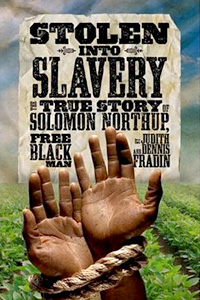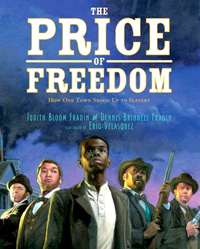Flight for Freedom: True stories of courageous individuals who escaped from slavery | Nonfiction Booktalker
This year marks the 150th anniversary of Abraham Lincoln’s signing of the 1863 Emancipation Proclamation. The document—an executive order rather than a law—was imperfect: the abolition of slavery was limited to specific geographic areas during the Civil War, and many slaves, impatient for emancipation, were already attempting to attain freedom on their own. These recently published books highlight the remarkable true stories of courageous Americans during this period of history.
 The experiences of a free New Yorker are told in Judith and Dennis Fradin’s Stolen into Slavery: The True Story of Solomon Northrup, Free Black Man (National Geographic, 2012). In 1841, Northrup, a resident of Saratoga Springs, New York, and a fine fiddler, was lured by a couple of con men to New York City with the promise of performing with a circus. Once he arrived, Northrup was drugged and sold into slavery and his name was changed by his Louisiana owners. All evidence that he was free vanished. He was methodically beaten and threatened to never tell anyone his story or reveal that he was literate.
The experiences of a free New Yorker are told in Judith and Dennis Fradin’s Stolen into Slavery: The True Story of Solomon Northrup, Free Black Man (National Geographic, 2012). In 1841, Northrup, a resident of Saratoga Springs, New York, and a fine fiddler, was lured by a couple of con men to New York City with the promise of performing with a circus. Once he arrived, Northrup was drugged and sold into slavery and his name was changed by his Louisiana owners. All evidence that he was free vanished. He was methodically beaten and threatened to never tell anyone his story or reveal that he was literate.
His nightmare lasted 12 years. Northrup eventually found someone he trusted enough to take a letter back to Saratoga Springs. After several months, two white men who knew him went to Louisiana and brought him back home. Show your booktalk listeners the photograph of Northrup’s descendants celebrating his life. They’ll feel like celebrating, too!
In Harriet Tubman and the Underground Railroad (Holiday House, 2013), David A. Adler isn’t content with simply focusing on the most famous escape artist of all. He introduces those who joined Tubman in one of the 13 death-defying exoduses she led from the slave states. Among the escapees was Peter Still, who crossed the Ohio River, asked locals for help, and was directed to an abolitionist society. The man to whom Still told his story realized that they were brothers—and took him to see their mother, whom he hadn’t seen in decades.
Adler outlines the horrors of the 1850 Fugitive Slave Act, which made it possible for Americans born free to be sold into slavery. These individuals were not allowed to testify on their own behalf in a court of law. The judges who made these decisions were paid $10 to declare the person a slave and $5 to declare someone free. Ask your booktalk audience how they think a judge would rule. In 1857, the Supreme Court ruled that no African American descended from a slave could ever become a citizen and that Congress could not exclude slavery from any of its territories. This decision turned many disinterested people into abolitionists.
 The Price of Freedom: How One Town Stood Up to Slavery (Walker, 2013), also by Judith and Dennis Fradin, introduces John Price, a slave who fled to Oberlin, Ohio, in 1856. The citizens of Oberlin believed that there was a higher law than the Fugitive Slave Act—the law of right and wrong. When Price was recaptured by a slave hunter, word spread quickly. Townsfolk, farmers, former slaves, and businessmen gathered to demand his release. He was freed and they put him on a train bound for Canada, where slavery was illegal. His rescuers then waited calmly for the laws at home to catch up with them. The town subsequently passed a new law: “No fugitive slave shall ever be taken from Oberlin either with or without a warrant, if we have the power to prevent it.” The two-page photograph of Price’s rescuers (some in danger of being returned to slavery) in the courtyard of the Cuyahoga County Jail will have a powerful effect on readers, and Eric Velasquez’s stunning, full-color illustrations will be remembered for a long time.
The Price of Freedom: How One Town Stood Up to Slavery (Walker, 2013), also by Judith and Dennis Fradin, introduces John Price, a slave who fled to Oberlin, Ohio, in 1856. The citizens of Oberlin believed that there was a higher law than the Fugitive Slave Act—the law of right and wrong. When Price was recaptured by a slave hunter, word spread quickly. Townsfolk, farmers, former slaves, and businessmen gathered to demand his release. He was freed and they put him on a train bound for Canada, where slavery was illegal. His rescuers then waited calmly for the laws at home to catch up with them. The town subsequently passed a new law: “No fugitive slave shall ever be taken from Oberlin either with or without a warrant, if we have the power to prevent it.” The two-page photograph of Price’s rescuers (some in danger of being returned to slavery) in the courtyard of the Cuyahoga County Jail will have a powerful effect on readers, and Eric Velasquez’s stunning, full-color illustrations will be remembered for a long time.
Civil rights and responsibilities are topics that young readers often hear adults debating. Offer these books to children in the fourth grade and above so they, too, can discuss these issues and develop a sense of pride in our country’s history.
RELATED
The job outlook in 2030: Librarians will be in demand
The job outlook in 2030: Librarians will be in demand
ALREADY A SUBSCRIBER? LOG IN
We are currently offering this content for free. Sign up now to activate your personal profile, where you can save articles for future viewing






Add Comment :-
Be the first reader to comment.
Comment Policy:
Comment should not be empty !!!